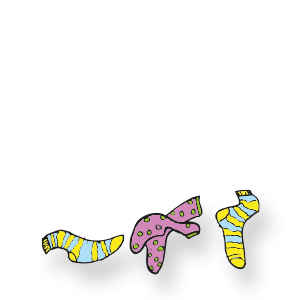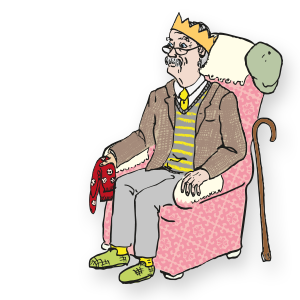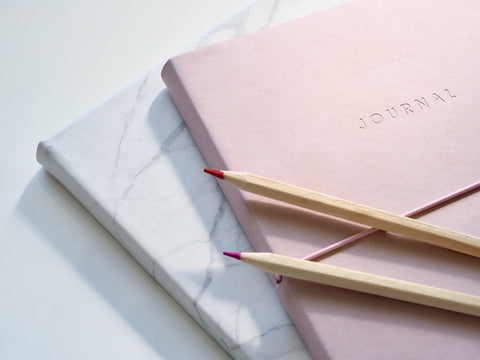

Dear Darling, please excuse my writing…

Written by Stacie Glass
We live in a progressive digital age but I’m about to explain how powerful pen and paper can be as a powerful tool to help us. Did you ever keep a diary when you were younger? One filled with amazingly exciting secrets? I remember having one with a lock on that you opened with a tiny key. I can’t remember the secrets it contained and I’m not so sure they were amazingly exciting but I do know it helped me to express what was whirling around in my head during the emotionally fraught teenage years.
Did you know there is a difference between keeping a diary and journaling?
I didn’t until fairly recently and it actually helped me to get past the blocks I previously encountered keeping a diary. What I realised was that I found it quite boring writing ‘dear diary’ type entries of what I did in a day – let’s face it, writing our daily lives down during a year of a pandemic would probably be repetitive!
Research has shown journaling to have many health benefits, improving both physical and mental wellbeing by reducing stress levels. It is believed that the act of writing accesses the left brain, which is analytical and rational. While the left brain is occupied by writing, the right brain is free to create, intuit and feel. Therefore, writing removes mental blocks and allows us to use all of our brainpower to better understand our inner world, others and the world around us.
Journaling is essentially self-directed writing therapy; a tool to share our inner world and story about the experiences, difficulties and joys we go through. It creates the space and opportunity to remove ourselves from identifying with the challenges; moving into awareness that it’s an experience we are going through, it is not who we are.
Journaling is like any other practice - we need to make time for it on a regular basis, even 10 minutes a day to feel the benefits. The longer you can write, the better because initially the ‘monkey mind’ will hijack your thoughts however, after a few minutes you will write what is actually behind those thoughts and you may be surprised what comes out.
Try not to force it onto your daily ‘to do’ list though – this will make it feel like a chore and then it works against you, not for you. Release any expectations of what it ‘should’ be or that you have to write perfectly. It is meant to be raw, unfiltered honest self-expression – give yourself permission to forget about spelling and grammar and just…write. If you prefer technology, there are note apps you can use or just simply type your words out…there are no rules, only the ones you create.
Journaling is…
- Individual to you – it’s what you want it to be and how you want to do it.
- A way to release ourselves of intense emotions and thoughts.
- A tool to organise our thoughts, behaviour and our lives in general.
- A way to evolve our self-awareness and to improve our relationships with ourselves.
- A way to tell our story exactly as we experience it and an opportunity to create new ones.
- It can be a process for healing and transformation.
- A tool for your future self to reflect back on your life.
- A safe space to write exactly how you feel without judgement…keep that self-critic in check!
Journaling does not…
- Replace the intentional action you have to take in your life to see changes, healing and growth.
- It doesn’t have to be boring and dull – make it what you want it to be and what works for you.
- It doesn’t have to be written words – it can be doodles, colours or drawings (even if you can’t draw like an artist!). If you’re very visual then lots of colours can be useful too.
- It doesn’t have to be shared or spoken out loud – unless you want it to be.
- It’s OK if journaling isn’t for you – try it every day with a timer (for as long as you can spare) for two weeks and see if you can notice any benefits.
Suggested questions to get started
Asking open ended questions like the ones below are helpful to uncover the thoughts and emotional responses that just by thinking them alone can’t; revealing our inner world so that it can be processed and released.
What do I want out of this practice?
I believe journaling will help me…
Am I willing to commit time and energy to getting the most out of this practice…?
Am I willing to be gentle with myself when writing out my inner world…?
Am I willing to look within, even when it’s uncomfortable…?
Today, I feel…
I give myself permission to…
I never…
I always…
Through writing, you may just discover that your journal is an all-accepting, non-judgmental friend…providing the cheapest therapy you will ever get!
Stacie Glass, Ollie Coach
Stacie is a registered midwife and has worked in the NHS since 2003 and in 2015 did research into mental health screening during pregnancy for a Master’s degree. She has always had an interest in psychology and mental wellbeing.
“I have been on the other side of therapy as the client for many years for my trauma of childhood sexual abuse which only makes me more passionate to help others heal emotionally/mentally. I am writing a book about life after sexual abuse in the hope to inspire others to speak their truth and find their own healing path to the life they deserve. Both my personal experience of childhood abuse and my passion for helping others with their mental/emotional wellbeing led me to where I am now becoming an Ollie Coach.”
To get in contact with Stacie, email Stacie.glass@ollieandhissuperpowers.com

